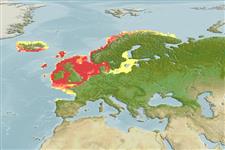Preferred temperature (Ref.
115969): 6.9 - 11.8, mean 8.9 (based on 284 cells).
Phylogenetic diversity index (Ref.
82804): PD
50 = 0.5156 [Uniqueness, from 0.5 = low to 2.0 = high].
Bayesian length-weight: a=0.00776 (0.00688 - 0.00876), b=3.09 (3.05 - 3.13), in cm Total Length, based on LWR estimates for this species (Ref.
93245).
Nivel trófico (Ref.
69278): 3.0 ±0.0 se; based on diet studies.
Resiliencia (Ref.
120179): Medio, población duplicada en un tiempo mínimo de 1.4-4.4 años (K=0.3-0.6; tm=2-3; tmax=12; Fec=50,000).
Prior r = 0.68, 95% CL = 0.45 - 1.02, Based on 3 full stock assessments.
Fishing Vulnerability (Ref.
59153): Moderate vulnerability (40 of 100).
Climate Vulnerability (Ref.
125649): Moderate vulnerability (43 of 100).
